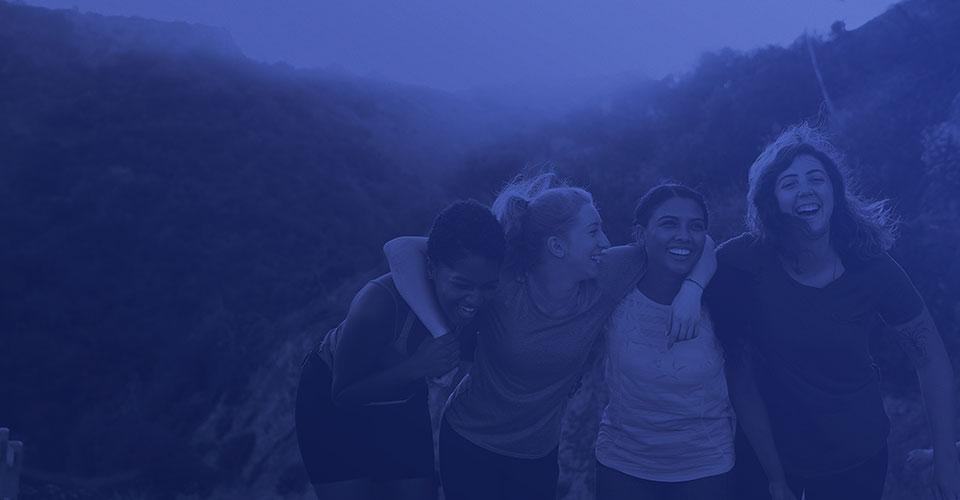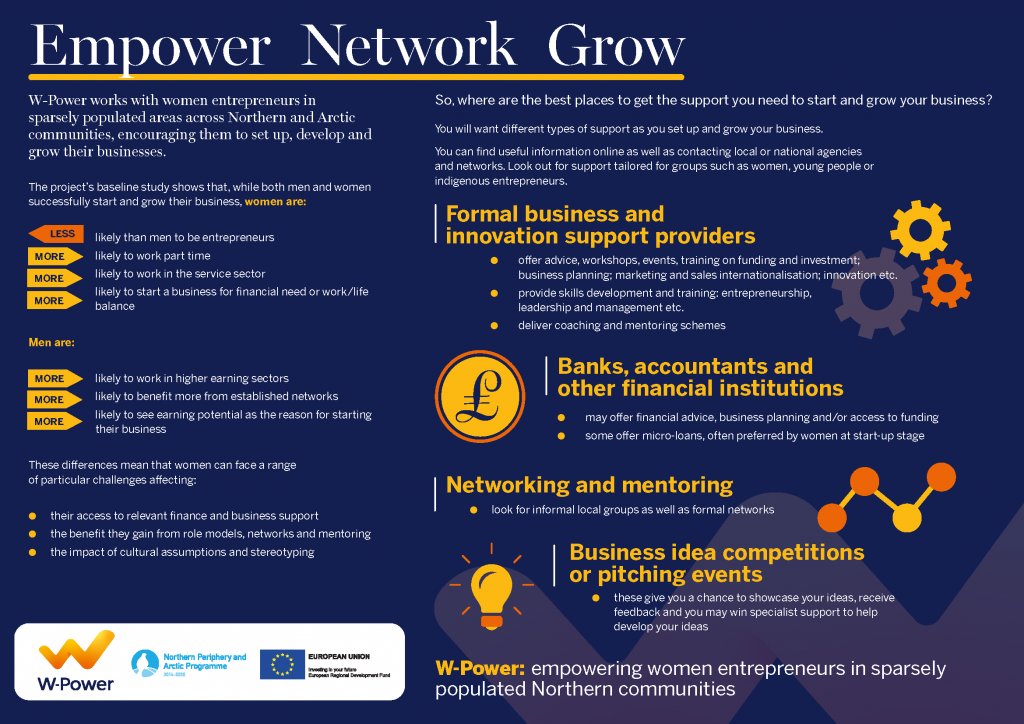
Helena Puhakka-Tarvainen, Reeta Sipola & Heidi Vartiainen
Sustainability and vitality of the rural Northern communities are the key targets of the ongoing W-Power project – Empowering Women Entrepreneurs in Sparsely Populated Northern Communities. The aim of the project is to encourage women in rural regions to start their own businesses or develop and internationalize the existing ones, which increases the level of self-sufficiency, economic balance and vitality of the communities. This goal equals to the one of the Finnish Universities of Applied Sciences: empowering regional development, supporting local economy and educating skilled professionals are the key tasks based on the legislation.
During the first two years of the project implementation, over 200 women have joined the project activities in seven regions across Northern Europe and Canada. W-Power is a three-year initiative coordinated by Karelia University of Applied Sciences, an active developer in the Northern Periphery and Arctic Programme (NPA 2020) since mid-1990s, and supported by Lapland University of Applied Sciences – a strong player in the Arctic Cooperation. There is obviously a hunger for initiatives of this kind, for rarely have the target audiences been so eager to join an EU project as with W-Power!
Women leave the rural North
The driver behind the project is the fact that especially young and educated women tend to leave rural communities, which causes demographic imbalance and challenges in the social structure and unsustainable local economies (ESPON 2013). Reasons for the outmigration are often related to the lack of job opportunities and services, rather than to the rural region itself. In fact, many times the desired way of living would include the nature and having space around oneself. Entrepreneurship is one solution for women living in the rural North to stay and make their living in their home regions, as modern ICT-solutions also diminish the role of the location in business. Thus, the aim of the project is to promote sustained, inclusive and sustainable economic growth, full and productive employment and decent work for all, based on the Agenda 2030 Sustainable Development Goal 8 (United Nations 2020).
Based on a survey replied by almost 200 female entrepreneurs in the project regions (North Karelia, Lapland, Northern Sweden, West Ireland, Iceland, Shetland and West Scotland), each region faces similar challenges (Scott 2019, 9–10). Also, the percentage of women entrepreneurs in the total labour force is significantly lower than that of men, and all figures are lower than the Europe 37 average (Scott 2019, 5). In all partner regions, women are more likely to be part time entrepreneurs than men. In addition, women entrepreneurs are more likely to work in administrative and service sectors, while men are more likely to work in energy, utilities, transportation, and construction sectors.
Scott’s (2019) report also concludes three key challenges towards female entrepreneurship. Based on the survey they are: (1) access to the finance and business support that meets the specific needs of women; (2) need for engagement with relevant role models, networks and mentors; and (3) impact of cultural assumptions and gender stereotyping. The key challenges are also presented in Figure 1.

Ensuring equal opportunities is important for the development of women entrepreneurship. In general, women tend to have shorter credit histories than men and less access to assets, so they may face more difficulties in accessing funding. In addition, women are less likely to be part of financial networks or receive angel investments, and tend to apply for and to receive lower funding amounts. Moreover, business support may inadvertently focus on supporting male-led businesses. Even in the equal Northern societies, gender-based assumptions are present. For example, publicly provided business support often targets particular sectors or type/size of businesses, typically led by men. ”One size fits all” approach in business support delivery favours traditional business models and growth plans that are also typically led by men. Background and family issues are not considered – or presumptions are misleading the discussion. One practical example was given by an anonymous male business advisor, who asked a female entrepreneur how she would deal with her business travelling while having children. Eventually, he realised himself that he would not have asked the same question, had he been advising a male entrepreneur.
Finally, the biggest invisible barrier for female entrepreneurship is the lack of role models. There is a need for successful businesswomen, who would show with their example that a successful self-employment is a real option also for women. Role models would be needed particularly in high growth sectors and female business venture capitalists. It is worth noting that women are currently under-represented in business leadership, so there are fewer female mentors to support women’s entrepreneurial growth.
On the survey conducted, the key development and capacity building needs of female entrepreneurs were outlined, which were summarized by Holmbom & Hägglund (2019, 13–16). The top upskilling needs related especially to the know-how on social media, networking, financing, business calculations, and how to find funding and investors.
Solving the common challenges with transnational cooperation
W-Power project empowers female entrepreneurs in several ways. First, the project provides methods for improving regional business environments. Second, opportunities for transnational learning are arranged. Third, the project raises awareness regarding gender-sensitive business coaching, and organises innovation platforms for new business ideas. The project offers practical tools and possibilities for concrete support, assistance with finance questions, and networking and training. Transnational cooperation offers possibilities for entering new markets, and embarking on new, global business paths, in addition to the good practices and role models.
As part of the project activities, a peer-to-peer mentoring programme was set-up and over 40 female entrepreneurs registered to take part in the programme. The goal of the programme is to match entrepreneurs across the project regions based on their motivation, development needs, and business sector in a way that both participants could learn equally from the process. The project supports the matching, facilitates the mentoring process, and enables the entrepreneurs to benchmark each other in their real business environments. Furthermore, the hidden agenda is to encourage the entrepreneurs to create a blog, or share social media contents of their process, and thus lower the threshold for such visibility tools, and, additionally, have free marketing for their services transnationally. The participants of the mentoring programme have been enthusiastic, and new initiatives for businesses across the regions have already been discussed. The COVID-19 pandemic has, however, caused some delays in the physical benchmark activities.
Another fruitful tool has been the creation of an innovation platform for new business ideas. Competition call has been opened in three categories: (1) rural women with new viable business ideas, (2) female entrepreneurs with an idea to expand their business globally, and (3) initiatives to support women-led businesses to succeed. In 2019, W-Power launched the platform internationally in all the seven project regions. Fifteen teams of total 24 applicants were pre-selected for a 5+10-minute pitch session. Finally, five business ideas were rewarded by EUR 2,000 grant each, for developing their business ideas further. In addition to the financial support, the project team follows the idea development, and provides support when business advisory services or coaching is needed. As an outcome, for example, a gluten free bakery with innovative recipes received support in Finland, and a horse archery course concept was piloted in Scotland, among others. It seems that a special call for female entrepreneurs has lowered the threshold for participating, as woman-led ideas are a vast minority in most business idea competitions. In the long run, this advances the gender equality as well as decision-making in local economy.
In addition to the existing and future female entrepreneurs, business advisors have been a target group for W-Power project activities, as they play a crucial role in the creation and development of especially SMEs (small and medium-sized enterprises). Providing equal support and funding is a key for developing women’s entrepreneurship. Based on a literature review and collection of best practices (Deane 2020, full report not published yet), gender aspects have not yet been widely taken into account in business advisory services. Instead, examples and models exist, for example in sports coaching. During W-Power implementation, a concept for a comprehensive and gender-aware business coaching will be created, business advisors will be provided with training, and the concept will be tested with pilot groups of entrepreneurs. If the feedback of the pilot turns out to be positive, the goal is to implement the concept widely in the business advisory services, and thus lower the barriers for female entrepreneurship also from the advisory services’ point of view.
Sustainability from different perspectives
Sustainability of the Northern and peripheral communities is not just taking care of the natural resources and implementing clean energy options, but it is the inclusion of all the community members to co-create a better environment to live in. In addition to gender-related issues, other underrepresented groups like immigrants, need support to become active community members. W-Power project has supported the inclusion by upskilling and networking people, and providing tools for self-employment and entrepreneurship. Furthermore, good local and international examples may increase the motivation to develop. Thus, by W-Power activities at least the following five sustainability goals are supported: gender equality, decent work and economic growth, reduced inequality, sustainable cities and communities, and partnerships to achieve the goal.
Northern Periphery and Arctic project themes support the education provided by universities of applied sciences. The projects offer a variety of possibilities for learning: small-scale studies and student group work, thesis topics, brainstorming, summer training, and even jobs, among others. More wider, transnational projects provide an innovation ecosystem for co-creation in multi-discipline networks, and thus support the RDI task given to the universities of applied sciences by law.
Authors
Helena Puhakka-Tarvainen, M.Sc., Senior Project Manager, Karelia University of Applied Sciences, helena.puhakka-tarvainen(at)karelia.fi
Reeta Sipola, M.Nat.Res., Project Manager, Lapland University of Applied Sciences, reeta.sipola(at)lapinamk.fi
Heidi Vartiainen, MA, Lecturer, Karelia University of Applied Sciences, heidi.vartiainen(at)karelia.fi
References
Deane, H. 2020. Train the Trainer Workshop: Gender Sensitivity in Coaching, Training & Mentoring. http://w-power.interreg-npa.eu/subsites/W-POWER/PowerPoint_Presentation.pdf 27.5.2020.
ESPON 2013. Gender Imbalances in European Regions. https://www.espon.eu/topics-policy/publications/maps-month/gender-imbalances-european-regions 30.8.2020.
Holmbom, P. & Hägglund, U. (eds.) 2019. Capacity Building Needs for Female Entrepreneurs in the Northern Periphery and Arctic. W-Power project. http://w-power.interreg-npa.eu/subsites/W-POWER/Capacity_building_needs_for_woman_entrepreneurs_in_the_Northern_Periphery_and_Arctic.pdf 30.8.2020.
NPA 2020. Northern Periphery and Arctic Programme 2014-2020. http://www.interreg-npa.eu/ 30.8.2020.
Scott, L. (ed.) 2019. Mapping the Challenges for Female Entrepreneurship in the Northern Periphery and Arctic. W-Power project. http://w-power.interreg-npa.eu/subsites/W-POWER/Mapping_the_challenges_for_woman_entrepreneurship_in_the_Northern_Periphery_and_Arctic.pdf 23.1.2020.
UN 2020. United Nations Sustainable Development Goals: Goal 8. https://sdgs.un.org/goals/goal8 30.8.2020



